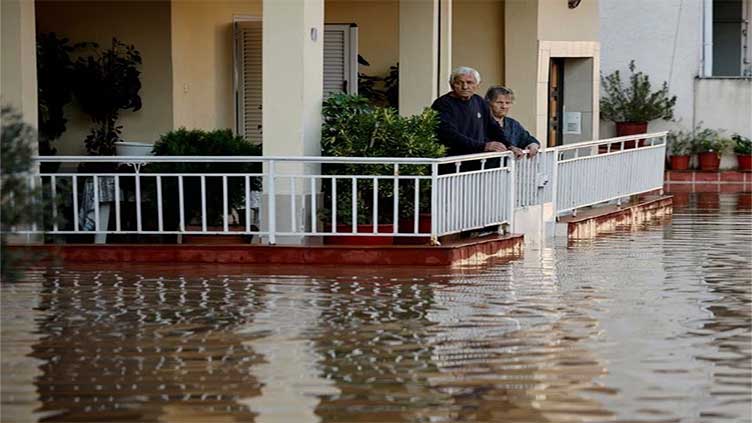As deadly Greek rainstorm ebbs, trail of devastation emerges

World
As deadly Greek rainstorm ebbs, trail of devastation emerges
LARISSA, Greece (Reuters) - Hundreds of people were stranded without food or water for a third day in Greece after a devastating rainstorm killed at least seven people and caused billions of euros of damage.
Storm Daniel, which meteorologists said was the worst to hit the country since records began in 1930, has left a trail of ruin across Thessaly in central Greece, and followed a record summer heat wave that touched off huge wildfires.
Homes were swept away by torrents, bridges collapsed, roads were made impassable, power lines fell and crops in one of Greece's main breadbasket regions wiped out.
"I don't think we have realised the magnitude of this disaster yet," Professor Efthymios Lekkas, a disaster management expert, told state broadcaster ERT on Friday.
On Friday, authorities issued evacuation orders for three areas around the central city of Larissa amid concern the river Pineios, the third-longest in Greece, could burst its banks.
Seven people have died from the flooding. The number of missing remained unclear. Greek authorities mounted a massive rescue operation, deploying helicopters to winch people off rooftops, as well as inflatables.
Many issued appeals through TV stations for help.
Prime Minister Kyriakos Mitsotakis visited the crisis-hit area on Friday. He cancelled a trip scheduled for Saturday to the northern city of Thessaloniki, where he was to deliver his annual keynote speech on the state of the economy.
The storm dealt a blow to the country which emerged from a decade-long debilitating debt crisis in 2018, but Mitsotakis said the economy could withstand the disaster.
"Greece's economy is now strong enough to tough out such a catastrophe. I will also mobilise every European resource so that we can get additional help to cover, firstly, necessary compensation for households," he told local officials.
WRITING ON THE WALL
Extreme weather events have struck across the globe in recent weeks, with floods in Scandinavia, southeast Europe and Hong Kong. In contrast, India had its driest August since records began more than a century ago.
The three-day deluge in Greece - in which, meteorologist George Tsatrafyllias said, one region received more rain in 24 hours than London does in an average year - followed a huge wildfire in northern Greece and the country's hottest summer on record.
Scientists say Greece is on the front line of climate change, with freak weather incidents increasingly common.
"Its just one event after the other," said Christos Zerefos, head at the Athens Academy Research Centre for Atmospheric Physics and Climatology.
"(The storm) was called Daniel because it predicts what will happen if we do nothing about climate change," Zerefos said, referring to a Biblical figure who was said to have prophesied an apocalypse.
VILLAGES SUBMERGED IN WATER AND MUD
Dozens of villages in the low-lying Thessaly region were submerged in water and local officials appealed for help via television stations.
"What we are living through is unprecedented .. a plain became a sea," said Michalis Sakellariou, 61.
Speaking to ERT, Thessaly Governor Kostas Agorastos said he estimated the storm had caused around three times the 700 million euros ($750 million) of damage inflicted by extensive floods in 2020.
More than 1,800 people had been rescued from flood-struck areas across Greece since Tuesday, the fire brigade said. In some areas floodwaters were still 2 metres (6.6 feet) deep.

